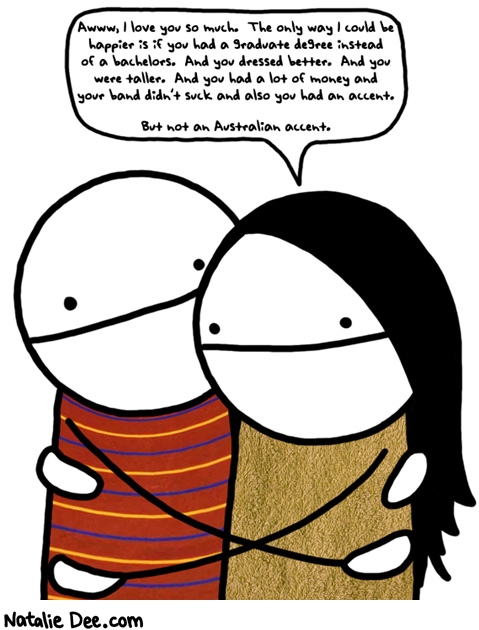
One of the delightful cartoons of Natalie Dee. See lots more here.
PREPARING FOR CIVILIZATION’S END
Trying to Cure Reality: A new book Manufacturing Depression, by Gary Greenberg (reviewed by Louis Menand in the New Yorker) debunks the industrial economy myth that depression is a disease that needs chemical and therapeutic “curing”. Our civilization is collapsing, we’ve exhausted the natural resources our planet took a billion years to store up, we live in suffocating, overcrowded, polluted, horrifically stressful conditions, and we have launched the planet into the 6th global extinction. Why shouldn’t we feel bad? Thanks to Raffi Aftandelian for the link:
The National Institute of Mental Health estimates that more than fourteen million Americans suffer from major depression every year, and more than three million suffer from minor depression (whose symptoms are milder but last longer than two years). Greenberg thinks that numbers like these are ridiculous—not because people aren’t depressed but because, in most cases, their depression is not a mental illness. It’s a sane response to a crazy world.
“We Think We Are the Doctors. We Are the Disease”: Chris Hedges explains how our civilization culture is buckling and starting to crumble, and how we must both resist and dismantle this culture and create new sustainable living models. Thanks to Paul Heft for the link. Excerpt:
All resistance must recognize that the body politic and global capitalism are dead. We should stop wasting energy trying to reform or appeal to it. This does not mean the end of resistance, but it does mean very different forms of resistance. It means turning our energies toward building sustainable communities to weather the coming crisis, since we will be unable to survive and resist without a cooperative effort.
The Path of (Most) Resistance: Along the same lines as Chris Hedges’ article above, Derrick Jensen in his new article in Orion says we need to get past our belief that “resistance is futile” and realize that if we really want to save the planet we have to fight:
We need organized political resistance. Power needs to be named and then dismantled systematically. This requires joint action of whatever sort is deemed necessary. While the frontline actionists are taking apart systems of power and fighting to defend wild nature, the culture of resistance is providing loyalty and cooperation and material support, as well as building up alternate institutions—from means of bringing justice to economic systems to food supply chains to schools to new literary forms—that can take over as the system comes down. The template is not hard to understand. It will take its own culturally appropriate forms.
Right now, a small group of half-starved, poverty-stricken people in Nigeria have brought the oil industry in that country to its knees. They remember what it is to love their land and their communities—perhaps because they are not drowning in privilege, but in the toxic sludge of oil extraction. Is that what it will take to get environmentalists in the U.S. to fight back? [These Nigerians have] said to the oil industry: “It must be clear that the Nigerian government cannot protect your workers or assets. Leave our land while you can or die in it.” There is more courage, integrity, intelligence, and pragmatism in that statement … than in any statement I have ever read by any American environmentalist, including myself. We need to accept the fact that making this type of statement (and being prepared to act on it) might be necessary to preserve a living planet.
(And in a related story: Several new local initiatives demonstrate that where there’s enough passion and energy focused at the local level, change happens. Thanks to the Bowen Island Phorum (my new daily guilty pleasure) for the link.)
Real Communities are Self-Organizing: Dmitri Orlov questions the feasibility of “building community”, arguing that organization cannot be imposed; it must occur by the collective consensus of members, or it won’t happen at all. Thanks to Jon Husband for the link. Excerpt:
How representative a democracy the US ever was is rather beside the point; the point is, it was once a country where people could successfully and openly self-organize, and now it isn’t. Once there were strong, cohesive communities in the US, which could organize and bring pressure to bear on their elected officials. And now, as described in Robert Putnam’s widely discussed book Bowling Alone (2000), there are no such strong, cohesive communities in the US, and so… they can’t organize, because, I would think, there is nothing for them to organize. Existence of communities allows communities to organize; lack of community prevents communities from organizing. That’s a bit of a tautology, is it not?
LIVING BETTER
5 Ways to Make Social Media Work: A great article and list by Justin Kownacki. (My comment to Justin on the list: “Much of this is about two important aspects of coping successfully in the 21st century: generosity (including listening and appreciation), and valuing your time — two things most of us are pretty lousy at.” The 5 Ways:
- Have a purpose (if you don’t have anything insightful, clever, novel, or useful to say, then don’t say anything)
- Don’t confuse media with marketing (one is communication; the other is trying to sell you something)
- Let someone else be the expert (focus on what you really are exemplary at)
- Comment selflessly (improve the conversation elsewhere than on your own blog)
- Kill one of your channels (say less, and in fewer places, and say it better)
Brilliant Idea That Needs to Be Free: I’m a huge fan of mind-mapping (graphic that captures visually the organization, ideas, decisions and learnings of a meeting, course curriculum or other intellectual work) and also of collaborative work and tools (wikis etc.) So the new app co-mapping, which allows mind-maps to be collaboratively developed (in real time or not) really appeals to me. Problem is, they’re charging user license fees for it. Can someone develop a free open source alternative, or better, show the developers of this tool a better business model to pay their development and maintenance costs?
Inflatable Sleeping Coat: An award-winning idea for hikers, campers, trekkers, and perhaps for water safety and potentially light water travel as well. Not to mention a possible boon for the homeless, today and, as numbers swell, in the future. Essentially, this is an insulated, water-proof coat with two detachable, inflatable sections that can serve as a bed and pillow, a cushion, or even as a raft. Terrific. Thanks to reader Tatu Siltanen for the link.
Giving Away the Store: A man in Oregon gave his devoted employees a special gift on his 81st birthday: their company. With the distressing trend to “demutualization” it’s refreshing to see the opposite: a corporation converted to a co-operative. Thanks to Tree for the link and the two that follow.
A Business That’s Mushrooming: Now mushrooms are finding use as all-natural building materials, biodegradable packaging and ‘green’ insulation.
Tarot as an Insight Incubator: Rather than a dubious predictive tool, some people are now using Tarot readings to stimulate creativity, insight and self-knowledge. “The cards help us to see ourselves and events symbolically, as archetypes, and therefore more objectively. And that has a way of making our personal dramas feel much less overwhelming.”
Even More Reasons to Move Your Money: Not only do they invest more ethically, small financial institutions like credit unions also charge you lower fees and give you better interest on your deposits.
How Touch Heals, Inspires and Sustains: New research shows the incredible power of human touch. Thanks to Jerry Michalski for the link.
Dreams of Cascadia: The idea of creating a new coastal nation running from Northern California to British Columbia is not new, but the recent Vancouver Olympics fanned the dreams of idealists that it was possible, only to dash them on the rocks of surly xenophobic customs agents on both sides of the border.
POLITICS AND ECONOMICS AS USUAL
The very rich get (much) richer: New government data shows that for the 400 richest US taxpayers, the last year of Bush was yet another windfall year, as despite the recession their average income rose by $81 million while their average tax rate dropped. Simply obscene.
Wall Street’s Pushed Us to a Second Brink: An expose by Matt Taibbi explains how recent actions of big financial institutions not only haven’t contributed to lowering risk of a second economic collapse, they’re actually deliberately precipitating one. Thanks to Raffi Aftandelian for the link.
When Corporations Really Rule the World — Now: John Robb describes the stranglehold that corporate interests now have on political power in the US. Thanks to Paul Heft for the link.
Here Comes Permanent Unemployment: This endless recession (despite the moronic MSM reports touting a recovery) is creating chronic victims: Millions who became unemployed and who may never find work again in a permanently gutted job market.
The Trauma of Industrial Childbirth: A woman’s haunting story of how the ordeal of modern induced childbirth, necessary as it may have been, has left her permanently scarred with PTSD.
MRSA Has a New Virulent Cousin: MRSA, a devastating and antibiotic-resistant bacteria killing thousands in hospitals today, has a new and even more potent and resistant cousin, called “Gram-Negative” Bacteria (The name refers to its undetectability in a certain test, not its mass). Further indication that our foolish strategy of trying to eradicate bacteria (the only life-form with a greater mass on Earth than humans) by soaking everything in antibiotics only serves to accelerate bacteria’s incredible adaptive capacity and create even more deadly diseases. When will we realize we can’t control the Earth and it’s evolution, even if we were wise enough to be able to discharge that power competently?
Undamming the Salmon: After a huge amount of work, all parties have agreed in principle to dismantle dams in Oregon and California that have devastated salmon stocks. But many hurdles remain.
FUN AND INSPIRATION
Blame Canada (2010 Version): Steve Almond’s priceless take on the Vancouver Olympics. “But maybe I’m being too cynical. Maybe the Olympics have always been about vertical integration of ancillary entertainment platforms.”

graphic of why people pirate movies (thanks to Rob Paterson for the link)
The Psychology of Small Urban Spaces: An old but still timely look at how humans behave in public spaces. Thanks to several readers for the link.
The Secret of the Maya: This is interesting, though I confess I find much of it unfathomable. Brilliant or nonsense? Thanks to Andrew Campbell for the link.
The Case for an Older Woman: OK Cupid provides some revealing data on what online daters are looking for, and what they should be looking for instead. We may lie about our biases, but we can’t hide from the numbers. Lots more to make you cringe with recognition or shame on this site — like this post on attractiveness. Thanks to Tree for the link.
Clever Made-Up Words: Results of a Washington Post contest from a few years ago that asked readers to take any word from the dictionary, alter it by adding, subtracting, or changing one letter, and supply a new definition. Thanks to Miralee for the link. The winners:
1. Cashtration (n.): The act of buying a house, which renders the subject financially impotent for an indefinite period of time.
2. Ignoranus: A person who’s both stupid and an asshole.
3. Intaxication: Euphoria at getting a tax refund, which lasts until you realize it was your money to start with.
4. Reintarnation: Coming back to life as a hillbilly.
5. Bozone (n.): The substance surrounding stupid people that stops bright ideas from penetrating. The bozone layer, unfortunately, shows little sign of breaking down in the near future.
6. Foreploy: Any misrepresentation a bout yourself for the purpose of getting lucky
7. Giraffiti: Vandalism spray-painted very, very high.
8. Sarchasm: The gulf between the author of sarcastic wit and the person who doesn’t get it.
9. Inoculatte: To take coffee intravenously when you are running late.
10. Hipatitis: Terminal coolness.
11. Osteopornosis: A degenerate disease.
12. Karmageddon: It’s when everybody is sending off all these really bad vibes, and then the Earth explodes, and it’s a serious bummer.
13. Decafalon (n.): The grueling event of getting through the day consuming only things that are good for you.
14. Glibido: All talk and no action.
15. Dopeler effect: The tendency of stupid ideas to seem smarter when they come at you rapidly.

Field Art: Thanks to Tree for the link.
THOUGHT FOR THE WEEK
From Bill Seitz “We don’t have many American product recalls, because we don’t make anything.”





Always a treat, your compilation–but this one is especially good–thanks, Dave and your readers/feeders.
re Tarot – read Robert Anton Wilson (and Tim Leary’s fiction) (and Grant Morrison’s “Pop Magick”, etc.) for examples of playful use of “magick” as mind-expansion.
Pingback: to cure reality « Thought Shop
Pingback: to cure reality « syncwpmu
Pingback: to cure reality « blog2sync
Pingback: One Stop Thought Shop » Blog Archive » to cure reality
Pingback: uberVU - social comments